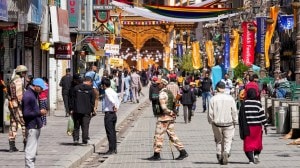S Korea drops ‘main enemy’ tag for North
For the first time in a decade, South Korea has stopped labelling North Korea its ‘‘main enemy’’ but its latest Defence ...

For the first time in a decade, South Korea has stopped labelling North Korea its ‘‘main enemy’’ but its latest Defence White Paper on Friday said it suspects the reclusive state of possessing nuclear weapons.
The tag of main enemy has angered the North in the past and the move to drop the label coincides with attempts by Seoul to coax the communist state back to six-party talks on ending Pyongyang’s nuclear ambitions. The Defence White Paper adopted the ‘‘main enemy’’ terminology in 1995, a year after a top North general said the communist state would turn Seoul into ‘‘a sea of fire’’ in the event of war.
‘‘The existing expression of the main enemy North Korea has been replaced by an explanation of the North’s specific military threat, such as its conventional weapons, weapons of mass destruction, and its forward deployment of military power,’’ the Defence Ministry said in briefing notes to the White Paper.
The North stopped using hostile language when referring to the South after an unprecedented summit between the two Koreas in 2000, the White Paper said, citing this as a reason for dropping the main enemy tag. The paper said there was no conclusive evidence that North Korea possessed nuclear weapons, but that Pyongyang ‘‘has been operating a five-megawatt nuclear reactor capable of producing additional plutonium since February 2003’’.
Military tension remains high despite warming political and commercial ties, and clashes in the Yellow Sea in recent years have killed or injured dozens of sailors on both sides. —Reuters



- 01
- 02
- 03
- 04
- 05



























